Case Study: Leadership for Beginning Practice on Septic Shock
VerifiedAdded on 2022/10/11
|10
|2998
|17
Case Study
AI Summary
This case study analyzes leadership in nursing, specifically examining a scenario involving a newly graduated nurse facing a challenging situation with a patient experiencing septic shock after pneumonia. The paper delves into the factors impacting nursing leaders and professional practice, focusing on the role of the Nurse Unit Manager (NUM) in supporting new graduates and fostering a culture of competence. It explores the expectations for beginning new graduate nurses, emphasizing the importance of communication, clinical skills, and teamwork. The Gibbs Model of Reflection is applied to analyze the situation, focusing on strategies to develop personal and professional resilience. The case study highlights the importance of supportive leadership, communication, and networking in promoting the development of new nurses and improving patient outcomes. The assignment also emphasizes the need for new nurses to be prepared for various clinical scenarios and to continuously seek knowledge and experience to provide quality care.
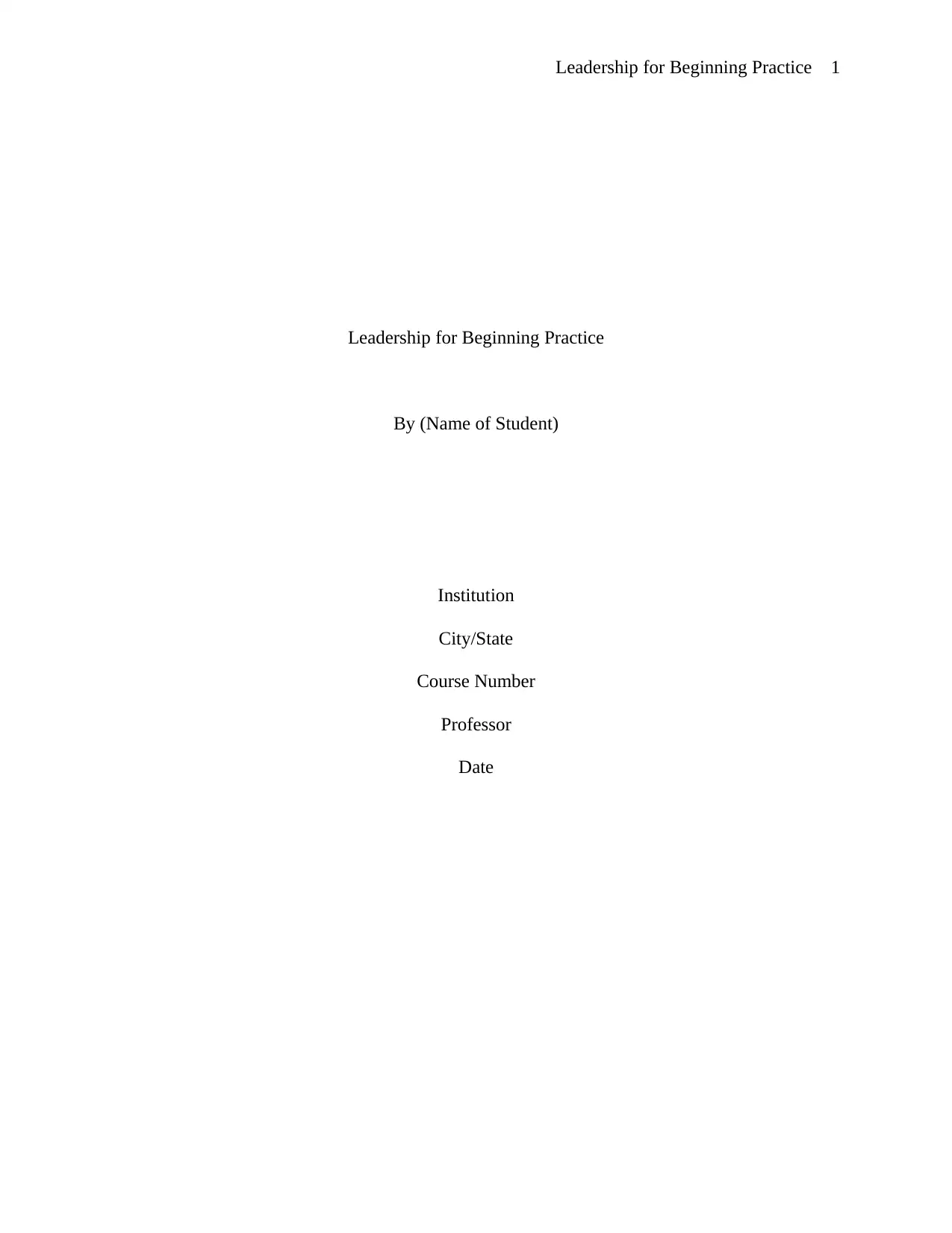
Leadership for Beginning Practice 1
Leadership for Beginning Practice
By (Name of Student)
Institution
City/State
Course Number
Professor
Date
Leadership for Beginning Practice
By (Name of Student)
Institution
City/State
Course Number
Professor
Date
Paraphrase This Document
Need a fresh take? Get an instant paraphrase of this document with our AI Paraphraser
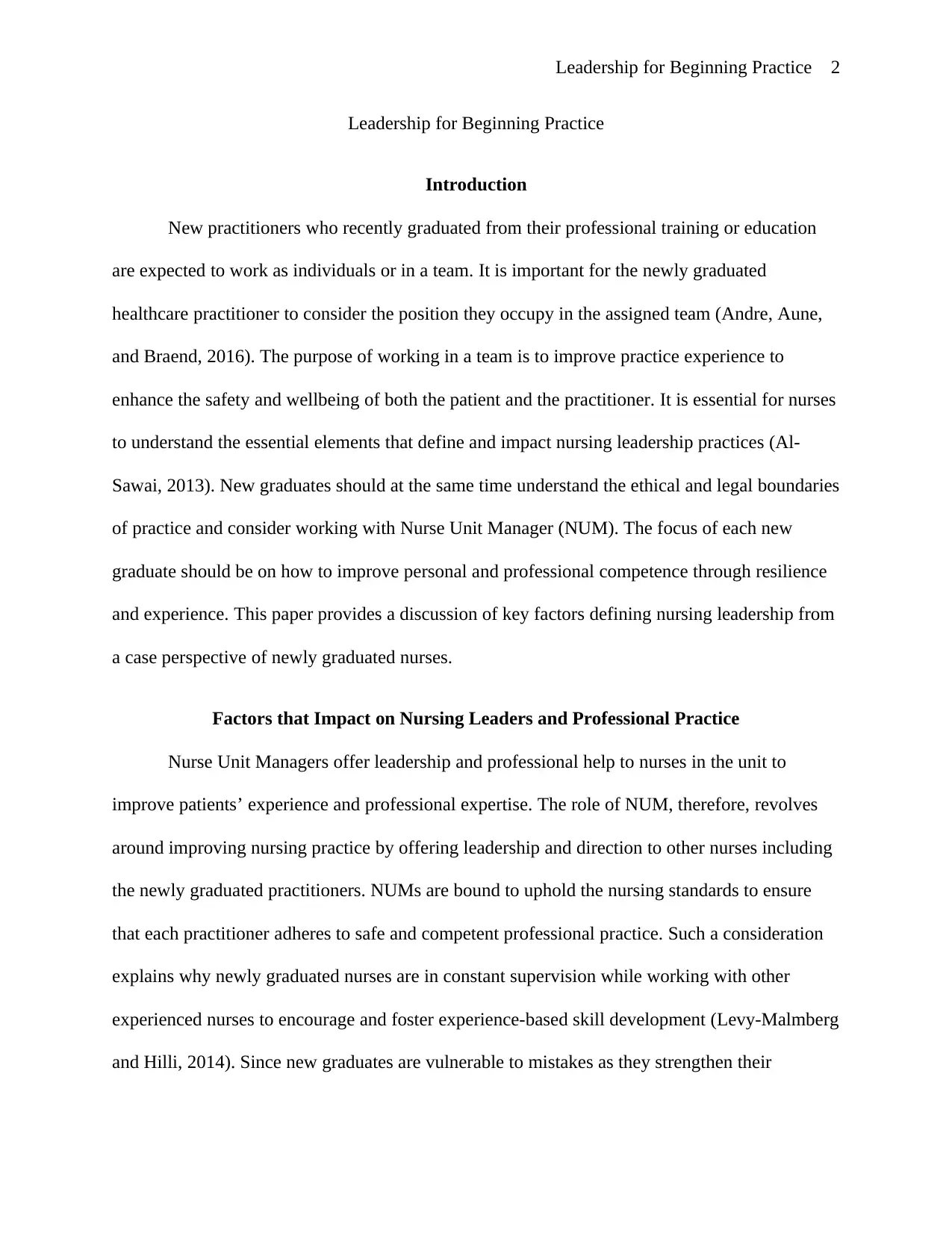
Leadership for Beginning Practice 2
Leadership for Beginning Practice
Introduction
New practitioners who recently graduated from their professional training or education
are expected to work as individuals or in a team. It is important for the newly graduated
healthcare practitioner to consider the position they occupy in the assigned team (Andre, Aune,
and Braend, 2016). The purpose of working in a team is to improve practice experience to
enhance the safety and wellbeing of both the patient and the practitioner. It is essential for nurses
to understand the essential elements that define and impact nursing leadership practices (Al-
Sawai, 2013). New graduates should at the same time understand the ethical and legal boundaries
of practice and consider working with Nurse Unit Manager (NUM). The focus of each new
graduate should be on how to improve personal and professional competence through resilience
and experience. This paper provides a discussion of key factors defining nursing leadership from
a case perspective of newly graduated nurses.
Factors that Impact on Nursing Leaders and Professional Practice
Nurse Unit Managers offer leadership and professional help to nurses in the unit to
improve patients’ experience and professional expertise. The role of NUM, therefore, revolves
around improving nursing practice by offering leadership and direction to other nurses including
the newly graduated practitioners. NUMs are bound to uphold the nursing standards to ensure
that each practitioner adheres to safe and competent professional practice. Such a consideration
explains why newly graduated nurses are in constant supervision while working with other
experienced nurses to encourage and foster experience-based skill development (Levy‐Malmberg
and Hilli, 2014). Since new graduates are vulnerable to mistakes as they strengthen their
Leadership for Beginning Practice
Introduction
New practitioners who recently graduated from their professional training or education
are expected to work as individuals or in a team. It is important for the newly graduated
healthcare practitioner to consider the position they occupy in the assigned team (Andre, Aune,
and Braend, 2016). The purpose of working in a team is to improve practice experience to
enhance the safety and wellbeing of both the patient and the practitioner. It is essential for nurses
to understand the essential elements that define and impact nursing leadership practices (Al-
Sawai, 2013). New graduates should at the same time understand the ethical and legal boundaries
of practice and consider working with Nurse Unit Manager (NUM). The focus of each new
graduate should be on how to improve personal and professional competence through resilience
and experience. This paper provides a discussion of key factors defining nursing leadership from
a case perspective of newly graduated nurses.
Factors that Impact on Nursing Leaders and Professional Practice
Nurse Unit Managers offer leadership and professional help to nurses in the unit to
improve patients’ experience and professional expertise. The role of NUM, therefore, revolves
around improving nursing practice by offering leadership and direction to other nurses including
the newly graduated practitioners. NUMs are bound to uphold the nursing standards to ensure
that each practitioner adheres to safe and competent professional practice. Such a consideration
explains why newly graduated nurses are in constant supervision while working with other
experienced nurses to encourage and foster experience-based skill development (Levy‐Malmberg
and Hilli, 2014). Since new graduates are vulnerable to mistakes as they strengthen their
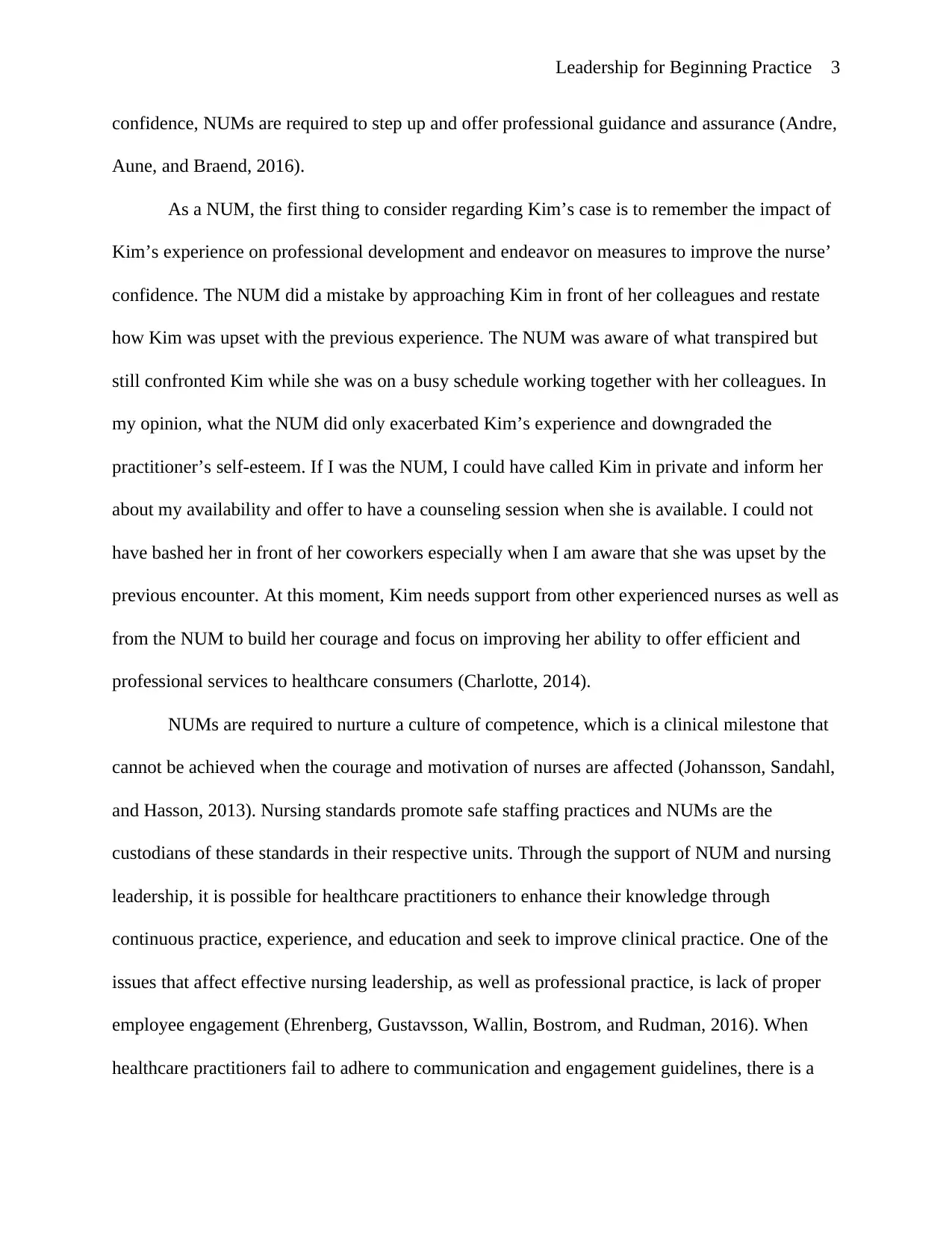
Leadership for Beginning Practice 3
confidence, NUMs are required to step up and offer professional guidance and assurance (Andre,
Aune, and Braend, 2016).
As a NUM, the first thing to consider regarding Kim’s case is to remember the impact of
Kim’s experience on professional development and endeavor on measures to improve the nurse’
confidence. The NUM did a mistake by approaching Kim in front of her colleagues and restate
how Kim was upset with the previous experience. The NUM was aware of what transpired but
still confronted Kim while she was on a busy schedule working together with her colleagues. In
my opinion, what the NUM did only exacerbated Kim’s experience and downgraded the
practitioner’s self-esteem. If I was the NUM, I could have called Kim in private and inform her
about my availability and offer to have a counseling session when she is available. I could not
have bashed her in front of her coworkers especially when I am aware that she was upset by the
previous encounter. At this moment, Kim needs support from other experienced nurses as well as
from the NUM to build her courage and focus on improving her ability to offer efficient and
professional services to healthcare consumers (Charlotte, 2014).
NUMs are required to nurture a culture of competence, which is a clinical milestone that
cannot be achieved when the courage and motivation of nurses are affected (Johansson, Sandahl,
and Hasson, 2013). Nursing standards promote safe staffing practices and NUMs are the
custodians of these standards in their respective units. Through the support of NUM and nursing
leadership, it is possible for healthcare practitioners to enhance their knowledge through
continuous practice, experience, and education and seek to improve clinical practice. One of the
issues that affect effective nursing leadership, as well as professional practice, is lack of proper
employee engagement (Ehrenberg, Gustavsson, Wallin, Bostrom, and Rudman, 2016). When
healthcare practitioners fail to adhere to communication and engagement guidelines, there is a
confidence, NUMs are required to step up and offer professional guidance and assurance (Andre,
Aune, and Braend, 2016).
As a NUM, the first thing to consider regarding Kim’s case is to remember the impact of
Kim’s experience on professional development and endeavor on measures to improve the nurse’
confidence. The NUM did a mistake by approaching Kim in front of her colleagues and restate
how Kim was upset with the previous experience. The NUM was aware of what transpired but
still confronted Kim while she was on a busy schedule working together with her colleagues. In
my opinion, what the NUM did only exacerbated Kim’s experience and downgraded the
practitioner’s self-esteem. If I was the NUM, I could have called Kim in private and inform her
about my availability and offer to have a counseling session when she is available. I could not
have bashed her in front of her coworkers especially when I am aware that she was upset by the
previous encounter. At this moment, Kim needs support from other experienced nurses as well as
from the NUM to build her courage and focus on improving her ability to offer efficient and
professional services to healthcare consumers (Charlotte, 2014).
NUMs are required to nurture a culture of competence, which is a clinical milestone that
cannot be achieved when the courage and motivation of nurses are affected (Johansson, Sandahl,
and Hasson, 2013). Nursing standards promote safe staffing practices and NUMs are the
custodians of these standards in their respective units. Through the support of NUM and nursing
leadership, it is possible for healthcare practitioners to enhance their knowledge through
continuous practice, experience, and education and seek to improve clinical practice. One of the
issues that affect effective nursing leadership, as well as professional practice, is lack of proper
employee engagement (Ehrenberg, Gustavsson, Wallin, Bostrom, and Rudman, 2016). When
healthcare practitioners fail to adhere to communication and engagement guidelines, there is a
⊘ This is a preview!⊘
Do you want full access?
Subscribe today to unlock all pages.

Trusted by 1+ million students worldwide
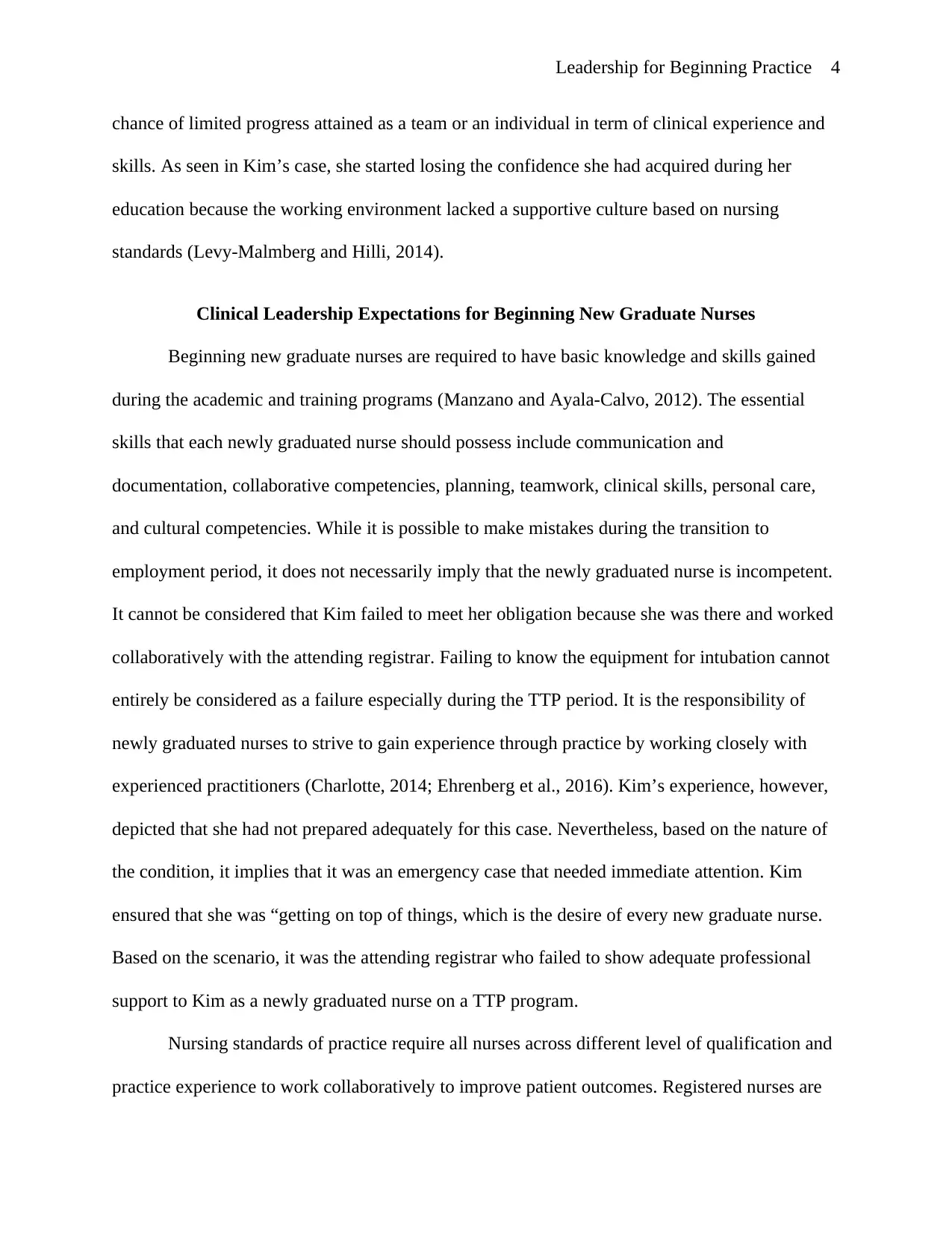
Leadership for Beginning Practice 4
chance of limited progress attained as a team or an individual in term of clinical experience and
skills. As seen in Kim’s case, she started losing the confidence she had acquired during her
education because the working environment lacked a supportive culture based on nursing
standards (Levy‐Malmberg and Hilli, 2014).
Clinical Leadership Expectations for Beginning New Graduate Nurses
Beginning new graduate nurses are required to have basic knowledge and skills gained
during the academic and training programs (Manzano and Ayala-Calvo, 2012). The essential
skills that each newly graduated nurse should possess include communication and
documentation, collaborative competencies, planning, teamwork, clinical skills, personal care,
and cultural competencies. While it is possible to make mistakes during the transition to
employment period, it does not necessarily imply that the newly graduated nurse is incompetent.
It cannot be considered that Kim failed to meet her obligation because she was there and worked
collaboratively with the attending registrar. Failing to know the equipment for intubation cannot
entirely be considered as a failure especially during the TTP period. It is the responsibility of
newly graduated nurses to strive to gain experience through practice by working closely with
experienced practitioners (Charlotte, 2014; Ehrenberg et al., 2016). Kim’s experience, however,
depicted that she had not prepared adequately for this case. Nevertheless, based on the nature of
the condition, it implies that it was an emergency case that needed immediate attention. Kim
ensured that she was “getting on top of things, which is the desire of every new graduate nurse.
Based on the scenario, it was the attending registrar who failed to show adequate professional
support to Kim as a newly graduated nurse on a TTP program.
Nursing standards of practice require all nurses across different level of qualification and
practice experience to work collaboratively to improve patient outcomes. Registered nurses are
chance of limited progress attained as a team or an individual in term of clinical experience and
skills. As seen in Kim’s case, she started losing the confidence she had acquired during her
education because the working environment lacked a supportive culture based on nursing
standards (Levy‐Malmberg and Hilli, 2014).
Clinical Leadership Expectations for Beginning New Graduate Nurses
Beginning new graduate nurses are required to have basic knowledge and skills gained
during the academic and training programs (Manzano and Ayala-Calvo, 2012). The essential
skills that each newly graduated nurse should possess include communication and
documentation, collaborative competencies, planning, teamwork, clinical skills, personal care,
and cultural competencies. While it is possible to make mistakes during the transition to
employment period, it does not necessarily imply that the newly graduated nurse is incompetent.
It cannot be considered that Kim failed to meet her obligation because she was there and worked
collaboratively with the attending registrar. Failing to know the equipment for intubation cannot
entirely be considered as a failure especially during the TTP period. It is the responsibility of
newly graduated nurses to strive to gain experience through practice by working closely with
experienced practitioners (Charlotte, 2014; Ehrenberg et al., 2016). Kim’s experience, however,
depicted that she had not prepared adequately for this case. Nevertheless, based on the nature of
the condition, it implies that it was an emergency case that needed immediate attention. Kim
ensured that she was “getting on top of things, which is the desire of every new graduate nurse.
Based on the scenario, it was the attending registrar who failed to show adequate professional
support to Kim as a newly graduated nurse on a TTP program.
Nursing standards of practice require all nurses across different level of qualification and
practice experience to work collaboratively to improve patient outcomes. Registered nurses are
Paraphrase This Document
Need a fresh take? Get an instant paraphrase of this document with our AI Paraphraser
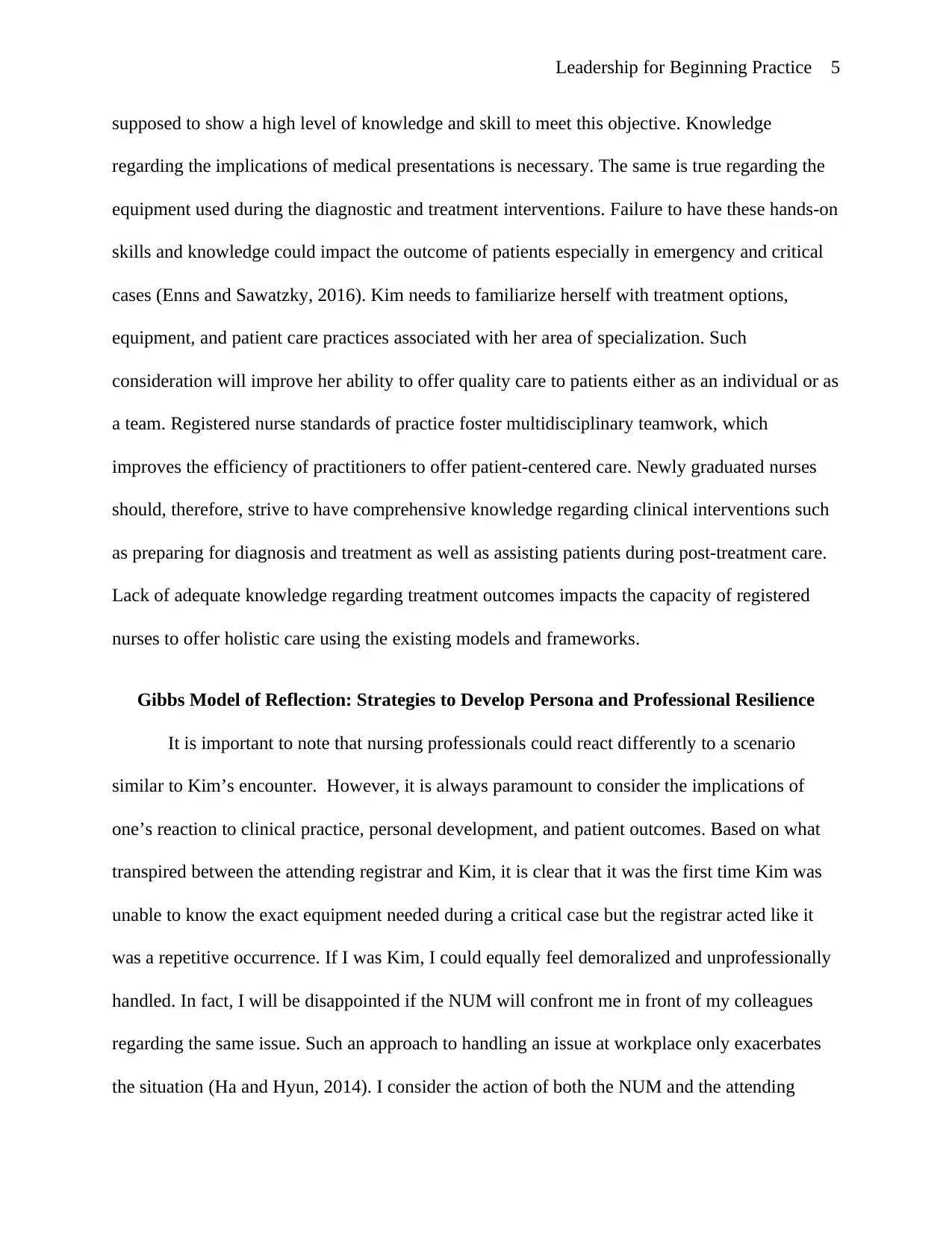
Leadership for Beginning Practice 5
supposed to show a high level of knowledge and skill to meet this objective. Knowledge
regarding the implications of medical presentations is necessary. The same is true regarding the
equipment used during the diagnostic and treatment interventions. Failure to have these hands-on
skills and knowledge could impact the outcome of patients especially in emergency and critical
cases (Enns and Sawatzky, 2016). Kim needs to familiarize herself with treatment options,
equipment, and patient care practices associated with her area of specialization. Such
consideration will improve her ability to offer quality care to patients either as an individual or as
a team. Registered nurse standards of practice foster multidisciplinary teamwork, which
improves the efficiency of practitioners to offer patient-centered care. Newly graduated nurses
should, therefore, strive to have comprehensive knowledge regarding clinical interventions such
as preparing for diagnosis and treatment as well as assisting patients during post-treatment care.
Lack of adequate knowledge regarding treatment outcomes impacts the capacity of registered
nurses to offer holistic care using the existing models and frameworks.
Gibbs Model of Reflection: Strategies to Develop Persona and Professional Resilience
It is important to note that nursing professionals could react differently to a scenario
similar to Kim’s encounter. However, it is always paramount to consider the implications of
one’s reaction to clinical practice, personal development, and patient outcomes. Based on what
transpired between the attending registrar and Kim, it is clear that it was the first time Kim was
unable to know the exact equipment needed during a critical case but the registrar acted like it
was a repetitive occurrence. If I was Kim, I could equally feel demoralized and unprofessionally
handled. In fact, I will be disappointed if the NUM will confront me in front of my colleagues
regarding the same issue. Such an approach to handling an issue at workplace only exacerbates
the situation (Ha and Hyun, 2014). I consider the action of both the NUM and the attending
supposed to show a high level of knowledge and skill to meet this objective. Knowledge
regarding the implications of medical presentations is necessary. The same is true regarding the
equipment used during the diagnostic and treatment interventions. Failure to have these hands-on
skills and knowledge could impact the outcome of patients especially in emergency and critical
cases (Enns and Sawatzky, 2016). Kim needs to familiarize herself with treatment options,
equipment, and patient care practices associated with her area of specialization. Such
consideration will improve her ability to offer quality care to patients either as an individual or as
a team. Registered nurse standards of practice foster multidisciplinary teamwork, which
improves the efficiency of practitioners to offer patient-centered care. Newly graduated nurses
should, therefore, strive to have comprehensive knowledge regarding clinical interventions such
as preparing for diagnosis and treatment as well as assisting patients during post-treatment care.
Lack of adequate knowledge regarding treatment outcomes impacts the capacity of registered
nurses to offer holistic care using the existing models and frameworks.
Gibbs Model of Reflection: Strategies to Develop Persona and Professional Resilience
It is important to note that nursing professionals could react differently to a scenario
similar to Kim’s encounter. However, it is always paramount to consider the implications of
one’s reaction to clinical practice, personal development, and patient outcomes. Based on what
transpired between the attending registrar and Kim, it is clear that it was the first time Kim was
unable to know the exact equipment needed during a critical case but the registrar acted like it
was a repetitive occurrence. If I was Kim, I could equally feel demoralized and unprofessionally
handled. In fact, I will be disappointed if the NUM will confront me in front of my colleagues
regarding the same issue. Such an approach to handling an issue at workplace only exacerbates
the situation (Ha and Hyun, 2014). I consider the action of both the NUM and the attending
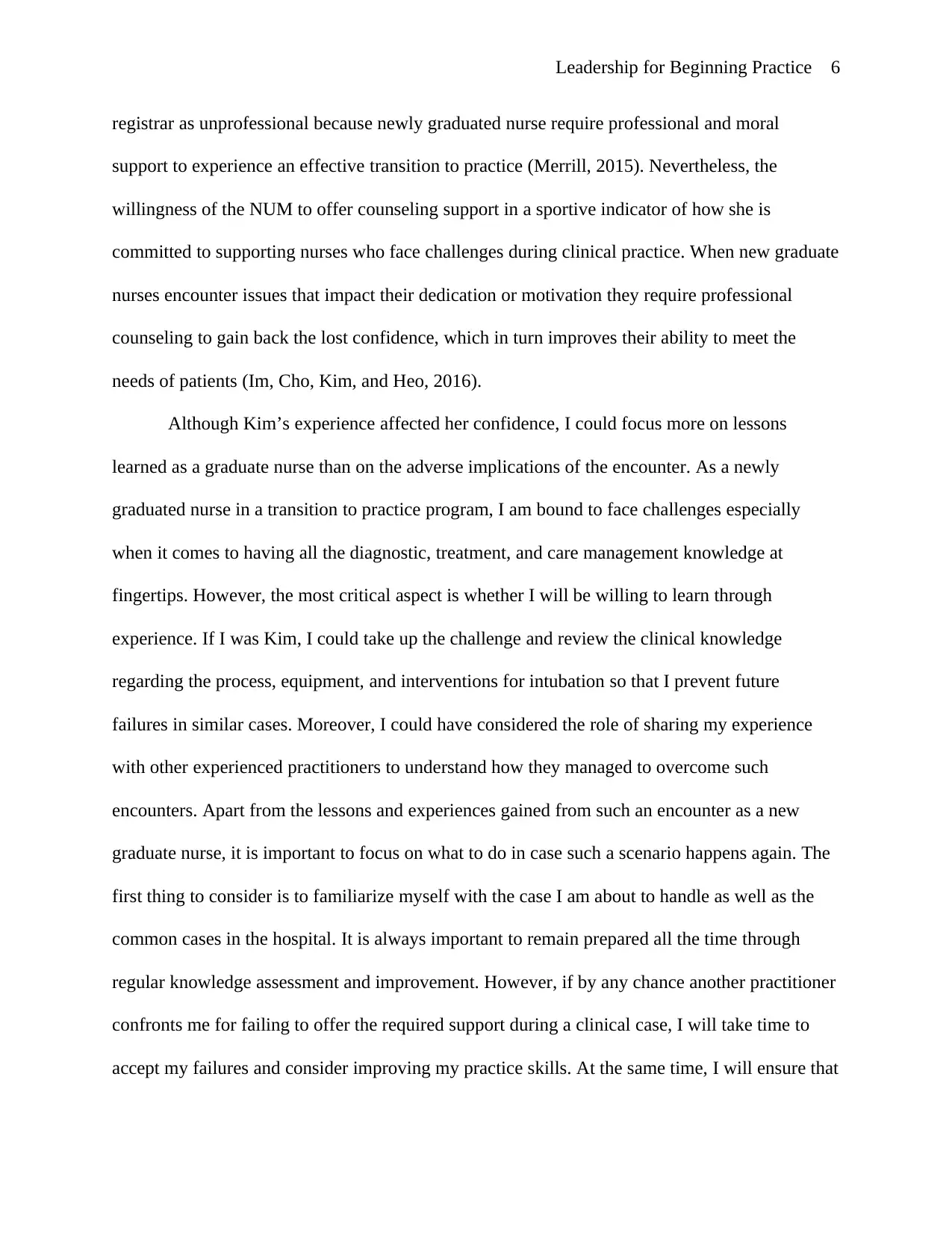
Leadership for Beginning Practice 6
registrar as unprofessional because newly graduated nurse require professional and moral
support to experience an effective transition to practice (Merrill, 2015). Nevertheless, the
willingness of the NUM to offer counseling support in a sportive indicator of how she is
committed to supporting nurses who face challenges during clinical practice. When new graduate
nurses encounter issues that impact their dedication or motivation they require professional
counseling to gain back the lost confidence, which in turn improves their ability to meet the
needs of patients (Im, Cho, Kim, and Heo, 2016).
Although Kim’s experience affected her confidence, I could focus more on lessons
learned as a graduate nurse than on the adverse implications of the encounter. As a newly
graduated nurse in a transition to practice program, I am bound to face challenges especially
when it comes to having all the diagnostic, treatment, and care management knowledge at
fingertips. However, the most critical aspect is whether I will be willing to learn through
experience. If I was Kim, I could take up the challenge and review the clinical knowledge
regarding the process, equipment, and interventions for intubation so that I prevent future
failures in similar cases. Moreover, I could have considered the role of sharing my experience
with other experienced practitioners to understand how they managed to overcome such
encounters. Apart from the lessons and experiences gained from such an encounter as a new
graduate nurse, it is important to focus on what to do in case such a scenario happens again. The
first thing to consider is to familiarize myself with the case I am about to handle as well as the
common cases in the hospital. It is always important to remain prepared all the time through
regular knowledge assessment and improvement. However, if by any chance another practitioner
confronts me for failing to offer the required support during a clinical case, I will take time to
accept my failures and consider improving my practice skills. At the same time, I will ensure that
registrar as unprofessional because newly graduated nurse require professional and moral
support to experience an effective transition to practice (Merrill, 2015). Nevertheless, the
willingness of the NUM to offer counseling support in a sportive indicator of how she is
committed to supporting nurses who face challenges during clinical practice. When new graduate
nurses encounter issues that impact their dedication or motivation they require professional
counseling to gain back the lost confidence, which in turn improves their ability to meet the
needs of patients (Im, Cho, Kim, and Heo, 2016).
Although Kim’s experience affected her confidence, I could focus more on lessons
learned as a graduate nurse than on the adverse implications of the encounter. As a newly
graduated nurse in a transition to practice program, I am bound to face challenges especially
when it comes to having all the diagnostic, treatment, and care management knowledge at
fingertips. However, the most critical aspect is whether I will be willing to learn through
experience. If I was Kim, I could take up the challenge and review the clinical knowledge
regarding the process, equipment, and interventions for intubation so that I prevent future
failures in similar cases. Moreover, I could have considered the role of sharing my experience
with other experienced practitioners to understand how they managed to overcome such
encounters. Apart from the lessons and experiences gained from such an encounter as a new
graduate nurse, it is important to focus on what to do in case such a scenario happens again. The
first thing to consider is to familiarize myself with the case I am about to handle as well as the
common cases in the hospital. It is always important to remain prepared all the time through
regular knowledge assessment and improvement. However, if by any chance another practitioner
confronts me for failing to offer the required support during a clinical case, I will take time to
accept my failures and consider improving my practice skills. At the same time, I will ensure that
⊘ This is a preview!⊘
Do you want full access?
Subscribe today to unlock all pages.

Trusted by 1+ million students worldwide
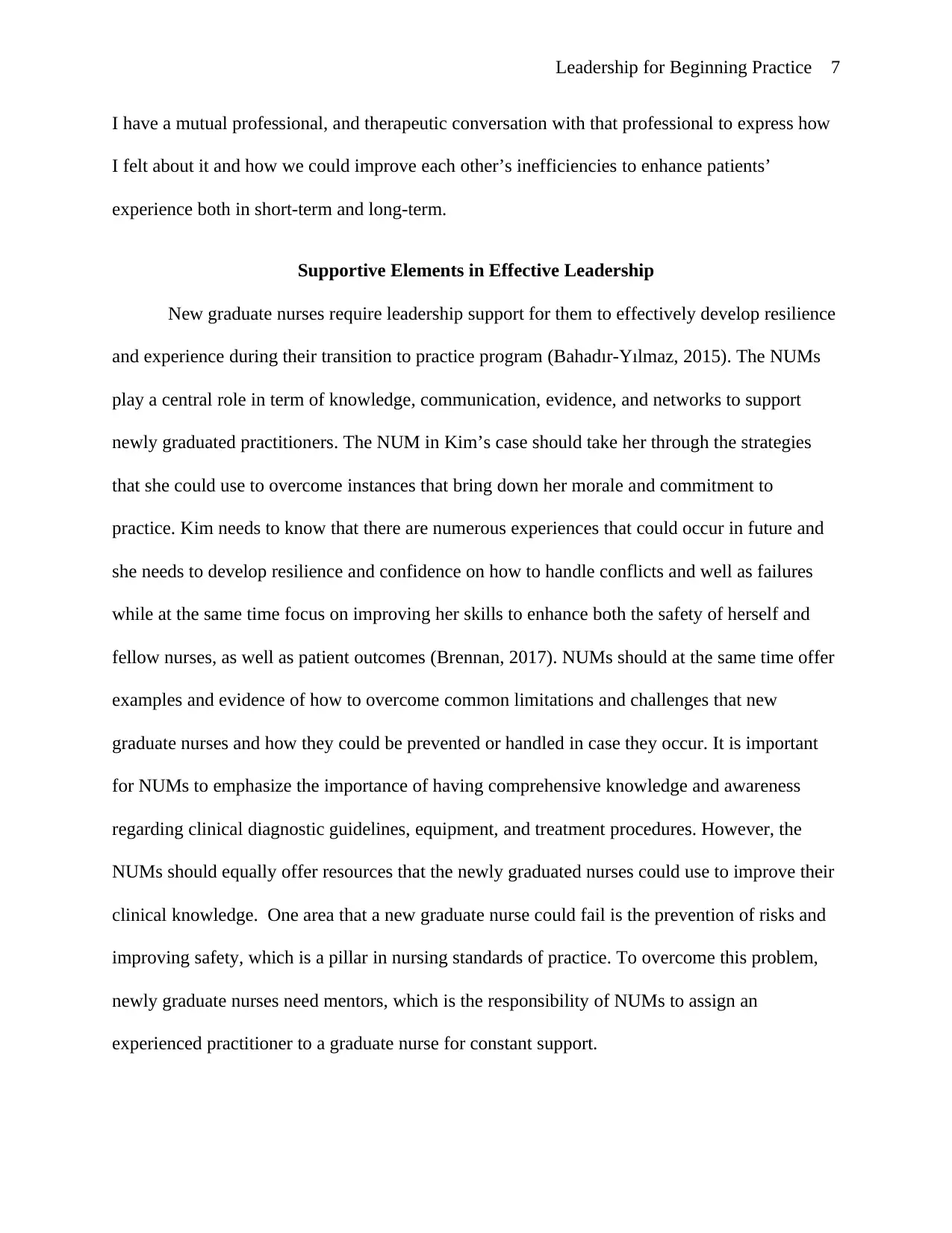
Leadership for Beginning Practice 7
I have a mutual professional, and therapeutic conversation with that professional to express how
I felt about it and how we could improve each other’s inefficiencies to enhance patients’
experience both in short-term and long-term.
Supportive Elements in Effective Leadership
New graduate nurses require leadership support for them to effectively develop resilience
and experience during their transition to practice program (Bahadır-Yılmaz, 2015). The NUMs
play a central role in term of knowledge, communication, evidence, and networks to support
newly graduated practitioners. The NUM in Kim’s case should take her through the strategies
that she could use to overcome instances that bring down her morale and commitment to
practice. Kim needs to know that there are numerous experiences that could occur in future and
she needs to develop resilience and confidence on how to handle conflicts and well as failures
while at the same time focus on improving her skills to enhance both the safety of herself and
fellow nurses, as well as patient outcomes (Brennan, 2017). NUMs should at the same time offer
examples and evidence of how to overcome common limitations and challenges that new
graduate nurses and how they could be prevented or handled in case they occur. It is important
for NUMs to emphasize the importance of having comprehensive knowledge and awareness
regarding clinical diagnostic guidelines, equipment, and treatment procedures. However, the
NUMs should equally offer resources that the newly graduated nurses could use to improve their
clinical knowledge. One area that a new graduate nurse could fail is the prevention of risks and
improving safety, which is a pillar in nursing standards of practice. To overcome this problem,
newly graduate nurses need mentors, which is the responsibility of NUMs to assign an
experienced practitioner to a graduate nurse for constant support.
I have a mutual professional, and therapeutic conversation with that professional to express how
I felt about it and how we could improve each other’s inefficiencies to enhance patients’
experience both in short-term and long-term.
Supportive Elements in Effective Leadership
New graduate nurses require leadership support for them to effectively develop resilience
and experience during their transition to practice program (Bahadır-Yılmaz, 2015). The NUMs
play a central role in term of knowledge, communication, evidence, and networks to support
newly graduated practitioners. The NUM in Kim’s case should take her through the strategies
that she could use to overcome instances that bring down her morale and commitment to
practice. Kim needs to know that there are numerous experiences that could occur in future and
she needs to develop resilience and confidence on how to handle conflicts and well as failures
while at the same time focus on improving her skills to enhance both the safety of herself and
fellow nurses, as well as patient outcomes (Brennan, 2017). NUMs should at the same time offer
examples and evidence of how to overcome common limitations and challenges that new
graduate nurses and how they could be prevented or handled in case they occur. It is important
for NUMs to emphasize the importance of having comprehensive knowledge and awareness
regarding clinical diagnostic guidelines, equipment, and treatment procedures. However, the
NUMs should equally offer resources that the newly graduated nurses could use to improve their
clinical knowledge. One area that a new graduate nurse could fail is the prevention of risks and
improving safety, which is a pillar in nursing standards of practice. To overcome this problem,
newly graduate nurses need mentors, which is the responsibility of NUMs to assign an
experienced practitioner to a graduate nurse for constant support.
Paraphrase This Document
Need a fresh take? Get an instant paraphrase of this document with our AI Paraphraser
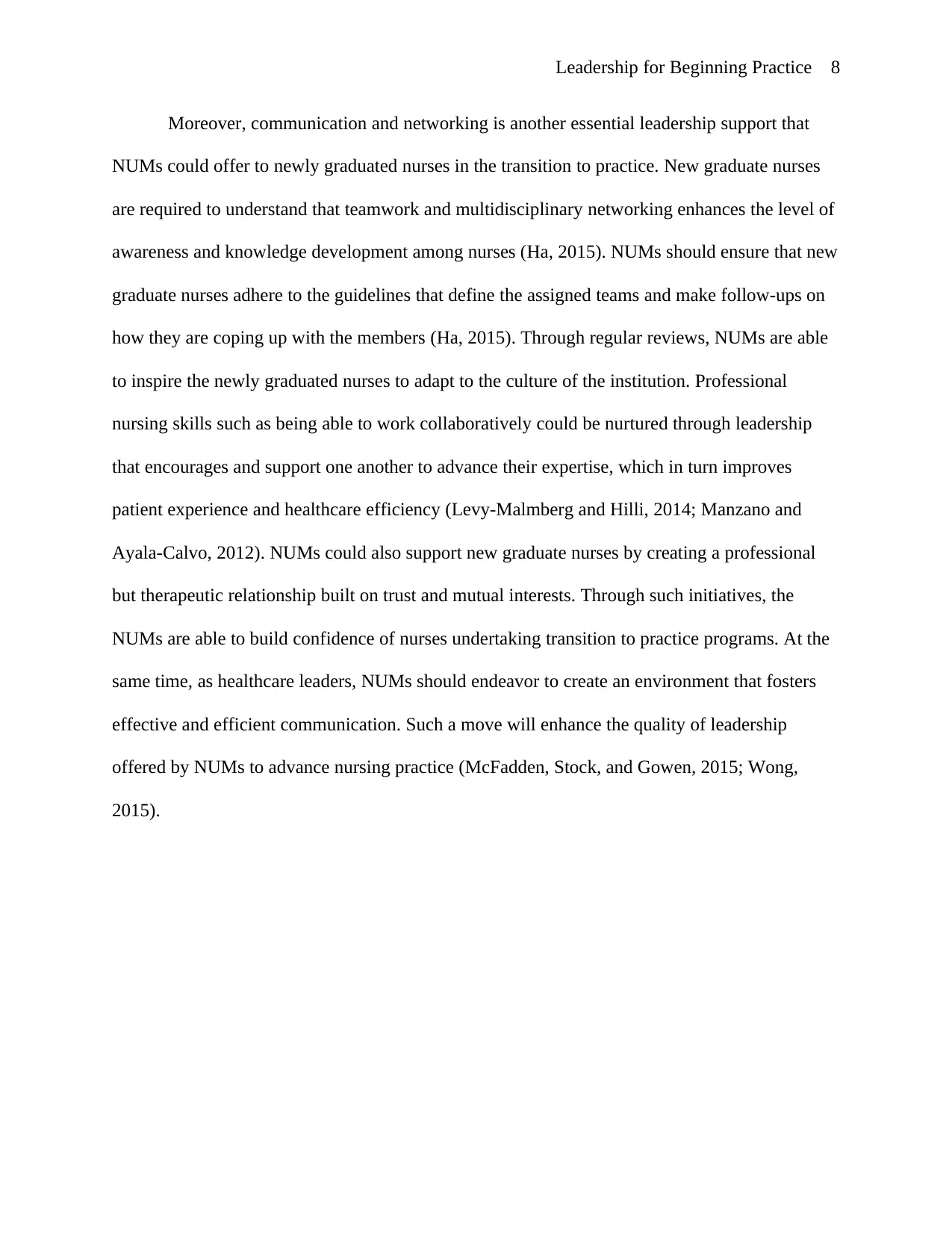
Leadership for Beginning Practice 8
Moreover, communication and networking is another essential leadership support that
NUMs could offer to newly graduated nurses in the transition to practice. New graduate nurses
are required to understand that teamwork and multidisciplinary networking enhances the level of
awareness and knowledge development among nurses (Ha, 2015). NUMs should ensure that new
graduate nurses adhere to the guidelines that define the assigned teams and make follow-ups on
how they are coping up with the members (Ha, 2015). Through regular reviews, NUMs are able
to inspire the newly graduated nurses to adapt to the culture of the institution. Professional
nursing skills such as being able to work collaboratively could be nurtured through leadership
that encourages and support one another to advance their expertise, which in turn improves
patient experience and healthcare efficiency (Levy‐Malmberg and Hilli, 2014; Manzano and
Ayala-Calvo, 2012). NUMs could also support new graduate nurses by creating a professional
but therapeutic relationship built on trust and mutual interests. Through such initiatives, the
NUMs are able to build confidence of nurses undertaking transition to practice programs. At the
same time, as healthcare leaders, NUMs should endeavor to create an environment that fosters
effective and efficient communication. Such a move will enhance the quality of leadership
offered by NUMs to advance nursing practice (McFadden, Stock, and Gowen, 2015; Wong,
2015).
Moreover, communication and networking is another essential leadership support that
NUMs could offer to newly graduated nurses in the transition to practice. New graduate nurses
are required to understand that teamwork and multidisciplinary networking enhances the level of
awareness and knowledge development among nurses (Ha, 2015). NUMs should ensure that new
graduate nurses adhere to the guidelines that define the assigned teams and make follow-ups on
how they are coping up with the members (Ha, 2015). Through regular reviews, NUMs are able
to inspire the newly graduated nurses to adapt to the culture of the institution. Professional
nursing skills such as being able to work collaboratively could be nurtured through leadership
that encourages and support one another to advance their expertise, which in turn improves
patient experience and healthcare efficiency (Levy‐Malmberg and Hilli, 2014; Manzano and
Ayala-Calvo, 2012). NUMs could also support new graduate nurses by creating a professional
but therapeutic relationship built on trust and mutual interests. Through such initiatives, the
NUMs are able to build confidence of nurses undertaking transition to practice programs. At the
same time, as healthcare leaders, NUMs should endeavor to create an environment that fosters
effective and efficient communication. Such a move will enhance the quality of leadership
offered by NUMs to advance nursing practice (McFadden, Stock, and Gowen, 2015; Wong,
2015).
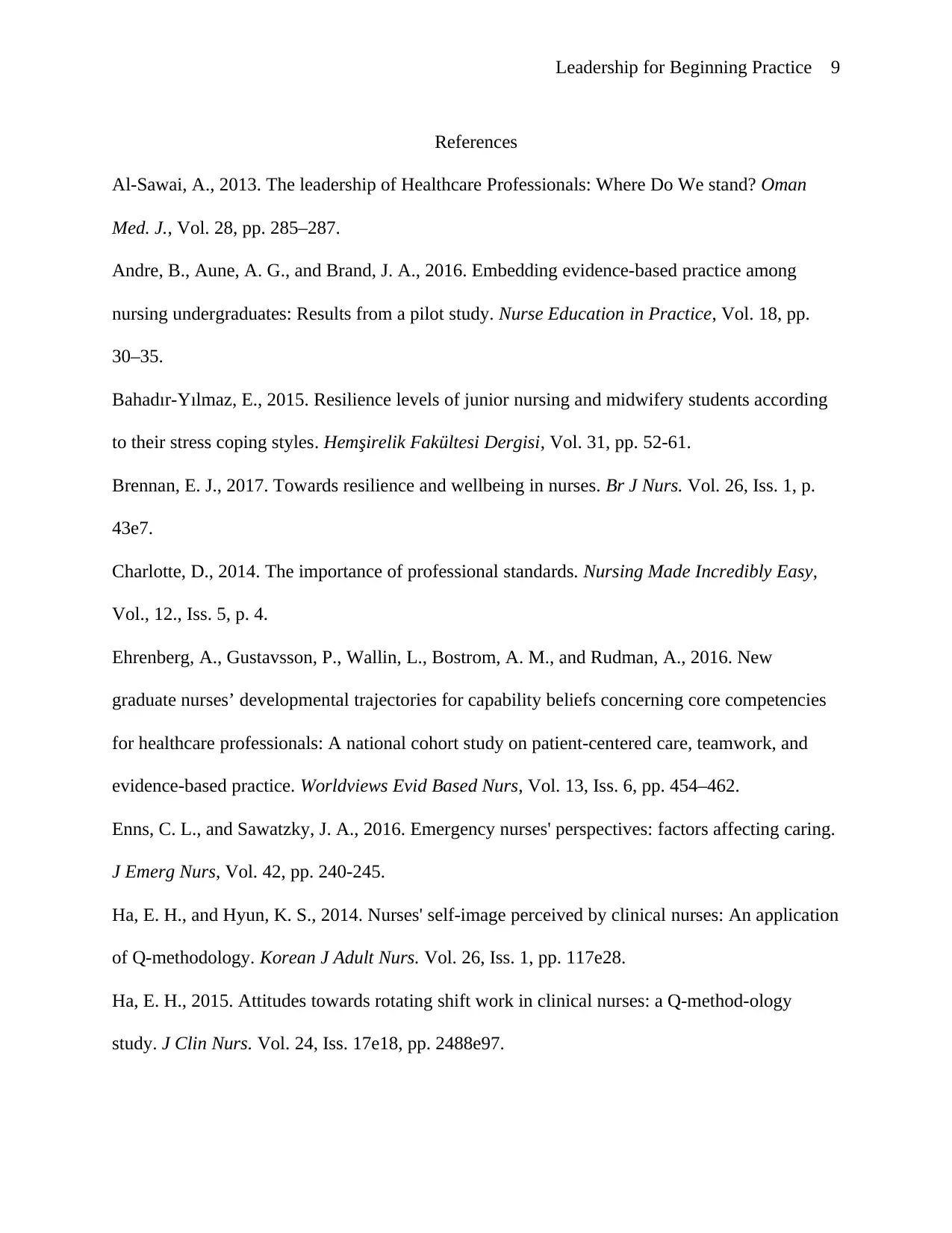
Leadership for Beginning Practice 9
References
Al-Sawai, A., 2013. The leadership of Healthcare Professionals: Where Do We stand? Oman
Med. J., Vol. 28, pp. 285–287.
Andre, B., Aune, A. G., and Brand, J. A., 2016. Embedding evidence‐based practice among
nursing undergraduates: Results from a pilot study. Nurse Education in Practice, Vol. 18, pp.
30–35.
Bahadır-Yılmaz, E., 2015. Resilience levels of junior nursing and midwifery students according
to their stress coping styles. Hemşirelik Fakültesi Dergisi, Vol. 31, pp. 52-61.
Brennan, E. J., 2017. Towards resilience and wellbeing in nurses. Br J Nurs. Vol. 26, Iss. 1, p.
43e7.
Charlotte, D., 2014. The importance of professional standards. Nursing Made Incredibly Easy,
Vol., 12., Iss. 5, p. 4.
Ehrenberg, A., Gustavsson, P., Wallin, L., Bostrom, A. M., and Rudman, A., 2016. New
graduate nurses’ developmental trajectories for capability beliefs concerning core competencies
for healthcare professionals: A national cohort study on patient‐centered care, teamwork, and
evidence‐based practice. Worldviews Evid Based Nurs, Vol. 13, Iss. 6, pp. 454–462.
Enns, C. L., and Sawatzky, J. A., 2016. Emergency nurses' perspectives: factors affecting caring.
J Emerg Nurs, Vol. 42, pp. 240-245.
Ha, E. H., and Hyun, K. S., 2014. Nurses' self-image perceived by clinical nurses: An application
of Q-methodology. Korean J Adult Nurs. Vol. 26, Iss. 1, pp. 117e28.
Ha, E. H., 2015. Attitudes towards rotating shift work in clinical nurses: a Q-method-ology
study. J Clin Nurs. Vol. 24, Iss. 17e18, pp. 2488e97.
References
Al-Sawai, A., 2013. The leadership of Healthcare Professionals: Where Do We stand? Oman
Med. J., Vol. 28, pp. 285–287.
Andre, B., Aune, A. G., and Brand, J. A., 2016. Embedding evidence‐based practice among
nursing undergraduates: Results from a pilot study. Nurse Education in Practice, Vol. 18, pp.
30–35.
Bahadır-Yılmaz, E., 2015. Resilience levels of junior nursing and midwifery students according
to their stress coping styles. Hemşirelik Fakültesi Dergisi, Vol. 31, pp. 52-61.
Brennan, E. J., 2017. Towards resilience and wellbeing in nurses. Br J Nurs. Vol. 26, Iss. 1, p.
43e7.
Charlotte, D., 2014. The importance of professional standards. Nursing Made Incredibly Easy,
Vol., 12., Iss. 5, p. 4.
Ehrenberg, A., Gustavsson, P., Wallin, L., Bostrom, A. M., and Rudman, A., 2016. New
graduate nurses’ developmental trajectories for capability beliefs concerning core competencies
for healthcare professionals: A national cohort study on patient‐centered care, teamwork, and
evidence‐based practice. Worldviews Evid Based Nurs, Vol. 13, Iss. 6, pp. 454–462.
Enns, C. L., and Sawatzky, J. A., 2016. Emergency nurses' perspectives: factors affecting caring.
J Emerg Nurs, Vol. 42, pp. 240-245.
Ha, E. H., and Hyun, K. S., 2014. Nurses' self-image perceived by clinical nurses: An application
of Q-methodology. Korean J Adult Nurs. Vol. 26, Iss. 1, pp. 117e28.
Ha, E. H., 2015. Attitudes towards rotating shift work in clinical nurses: a Q-method-ology
study. J Clin Nurs. Vol. 24, Iss. 17e18, pp. 2488e97.
⊘ This is a preview!⊘
Do you want full access?
Subscribe today to unlock all pages.

Trusted by 1+ million students worldwide
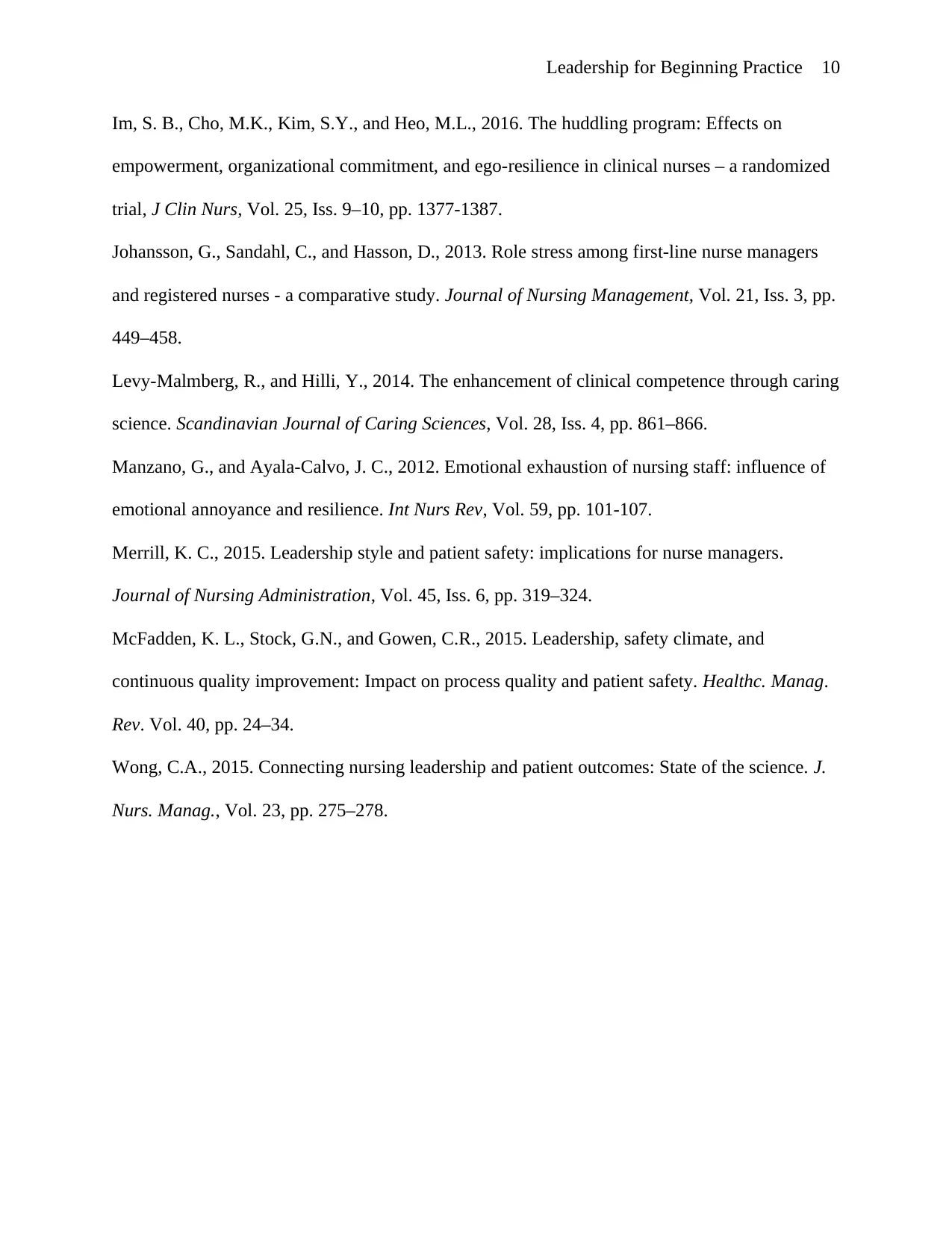
Leadership for Beginning Practice 10
Im, S. B., Cho, M.K., Kim, S.Y., and Heo, M.L., 2016. The huddling program: Effects on
empowerment, organizational commitment, and ego-resilience in clinical nurses – a randomized
trial, J Clin Nurs, Vol. 25, Iss. 9–10, pp. 1377-1387.
Johansson, G., Sandahl, C., and Hasson, D., 2013. Role stress among first‐line nurse managers
and registered nurses ‐ a comparative study. Journal of Nursing Management, Vol. 21, Iss. 3, pp.
449–458.
Levy‐Malmberg, R., and Hilli, Y., 2014. The enhancement of clinical competence through caring
science. Scandinavian Journal of Caring Sciences, Vol. 28, Iss. 4, pp. 861–866.
Manzano, G., and Ayala-Calvo, J. C., 2012. Emotional exhaustion of nursing staff: influence of
emotional annoyance and resilience. Int Nurs Rev, Vol. 59, pp. 101-107.
Merrill, K. C., 2015. Leadership style and patient safety: implications for nurse managers.
Journal of Nursing Administration, Vol. 45, Iss. 6, pp. 319–324.
McFadden, K. L., Stock, G.N., and Gowen, C.R., 2015. Leadership, safety climate, and
continuous quality improvement: Impact on process quality and patient safety. Healthc. Manag.
Rev. Vol. 40, pp. 24–34.
Wong, C.A., 2015. Connecting nursing leadership and patient outcomes: State of the science. J.
Nurs. Manag., Vol. 23, pp. 275–278.
Im, S. B., Cho, M.K., Kim, S.Y., and Heo, M.L., 2016. The huddling program: Effects on
empowerment, organizational commitment, and ego-resilience in clinical nurses – a randomized
trial, J Clin Nurs, Vol. 25, Iss. 9–10, pp. 1377-1387.
Johansson, G., Sandahl, C., and Hasson, D., 2013. Role stress among first‐line nurse managers
and registered nurses ‐ a comparative study. Journal of Nursing Management, Vol. 21, Iss. 3, pp.
449–458.
Levy‐Malmberg, R., and Hilli, Y., 2014. The enhancement of clinical competence through caring
science. Scandinavian Journal of Caring Sciences, Vol. 28, Iss. 4, pp. 861–866.
Manzano, G., and Ayala-Calvo, J. C., 2012. Emotional exhaustion of nursing staff: influence of
emotional annoyance and resilience. Int Nurs Rev, Vol. 59, pp. 101-107.
Merrill, K. C., 2015. Leadership style and patient safety: implications for nurse managers.
Journal of Nursing Administration, Vol. 45, Iss. 6, pp. 319–324.
McFadden, K. L., Stock, G.N., and Gowen, C.R., 2015. Leadership, safety climate, and
continuous quality improvement: Impact on process quality and patient safety. Healthc. Manag.
Rev. Vol. 40, pp. 24–34.
Wong, C.A., 2015. Connecting nursing leadership and patient outcomes: State of the science. J.
Nurs. Manag., Vol. 23, pp. 275–278.
1 out of 10
Related Documents
Your All-in-One AI-Powered Toolkit for Academic Success.
+13062052269
info@desklib.com
Available 24*7 on WhatsApp / Email
![[object Object]](/_next/static/media/star-bottom.7253800d.svg)
Unlock your academic potential
Copyright © 2020–2026 A2Z Services. All Rights Reserved. Developed and managed by ZUCOL.





